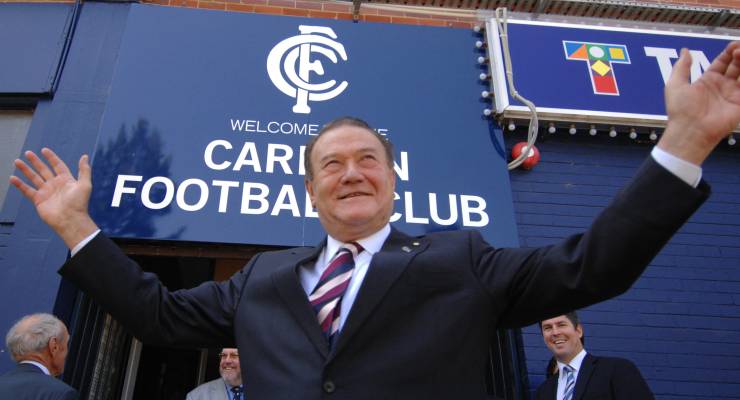
Richard Pratt, billionaire businessman
The growing movement of women speaking out about harassment from powerful men is good news for crisis managers, as companies prepare their plans to deal with any potential complaints. Last week, Crikey took you behind the process those consultants usually take when dealing with personal reputation crises. Today, we have a look at some of Australia’s biggest controversies, and how spinners managed them.
Peter Hollingworth
When you Google short-serving governor-general Peter Hollingworth, almost the entire first page of results relates to his handling of a child sex abuse case from when he was Anglican Archbishop of Brisbane in the 1990s.
Hollingworth was appointed as the Queen’s representative in Australia in 2001, and his tenure was marked by an increasing focus on the church’s handling of sexual abuse cases. He briefly used Mike Smith as a crisis and media consultant, but the “apologies” he made during this time weren’t well-received. While he may have received competing legal and reputational advice, his half-apologies and an interview with the ABC’s Australian Story in which he appeared to blame a 14-year-old victim only made him even less sympathetic.
On his resignation in 2003, Mike Seccombe wrote in The Sydney Morning Herald that Hollingworth’s speech announcing the decision might have garnered some sympathy:
The judgement of history may even be a little gentler after last night. At the very end, Hollingworth at last succeeded in striking the right note while addressing the allegations that have dogged him for most of his fraught term in the nation’s highest office. The difference was penitence … there was little hint of the blame-shifting and rationalisation which has been a pattern in Hollingworth’s recent career.
That may be so, but no matter how good Hollingworth’s apology, he’s unlikely to restore his reputation in the eyes of the public.
Richard Pratt
In 2007, billionaire Richard Pratt was trying to manage the fallout from copping the largest-ever fine with his company Visy for price-fixing. Having received awards including Australia’s highest honour, the Companion of the Order of Australia, Pratt was facing a textbook reputational crisis. Just before the record fine was announced, Pratt sat down for a sympathetic interview and profile with The Weekend Australian Magazine.
The subject of Pratt’s well-known philanthropy came up, with the businessman up-front about the reasons behind it:
“Of course there is self-interest, it is public relations,” he says. He admits he has at times wondered whether his philanthropy was a “way of buying respect”, but says that in the end “you don’t buy respect, you get respect by giving respect”.
Elsewhere in the interview, Pratt spoke of how much he valued his reputation: “My reputation is something I have been building for 50 years and so I am worried that the general public will now see me as a rich person who made his money doing something that is wrong in the eyes of the law. I have taken it very personally.”
And so it was, that following the fine, a public relations consultant sat down for a meeting with some media bosses to test out a potential PR move to rebuild Pratt’s destroyed rep: how would it go down with the public if he donated $1 billion to charity?
The response to Pratt’s previous go-to for building up his reputation was, predictably, lukewarm. In a profile on Pratt’s PR consultant Mike Smith, The Australian said it was Smith who convinced his client to agree to a profile with The Age too.
Steve Vizard
At the height of Steve Vizard’s downfall, he also had Smith spinning for him. In 2005, The Age attributed Vizard successfully avoiding a “severe mauling from the corporate watchdog” to his lawyers and spin doctors. Vizard’s people negotiated with ASIC for him to avoid criminal charges and instead receive civil penalties. According to The Age, Smith and his business partner David Wilson were calling media executives to argue Vizard’s case:
In the spin were carefully constructed phrases such as these: “Steve is grateful that these matters have been brought to a head after two years of uncertainty.” He was looking forward to having the court deal with the case “so he can put them behind him and get on with the rest of his life”. During the follow-up yesterday, Mr Smith explained that Vizard had been in touch with him on Monday night … “I called around a number of his friends and associates yesterday and without exception they are giving him their best wishes,” Mr Smith said.
Mark McInnes
When Kristy Fraser-Kirk launched a $37 million sexual harassment claim in 2010 against her former employer David Jones and its CEO Mark McInnes, the spin quickly followed. Fraser-Kirk and McInnes both hired PR consultants — McInnes got Sue Cato on board to help with his personal reputation.
As The Australian reported at the time, press were conveniently poised to cover McInnes’ arrival back in Sydney a couple of months after the allegations surfaced. The court case settled, and McInnes quit DJs, but he landed on his feet. He was made CEO of Premier Retail within months of the scandal, and still makes the gossip, business and real estate sections from time to time — only as a successful businessman, with barely a mention of the scandal that could’ve ended his career.








Crikey is committed to hosting lively discussions. Help us keep the conversation useful, interesting and welcoming. We aim to publish comments quickly in the interest of promoting robust conversation, but we’re a small team and we deploy filters to protect against legal risk. Occasionally your comment may be held up while we review, but we’re working as fast as we can to keep the conversation rolling.
The Crikey comment section is members-only content. Please subscribe to leave a comment.
The Crikey comment section is members-only content. Please login to leave a comment.